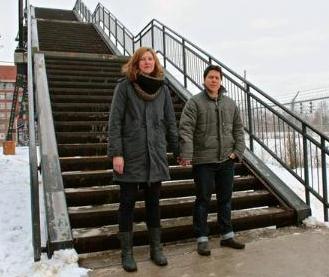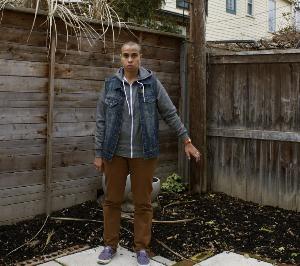
Sara and Lisa: the first former couple to hold hands for Clarke.
When Michele Pearson Clarke contacted me about the photography project she is working on, my thoughts ran immediately to seeing Emmylou Harris perform at the Greenbelt Harvest Picnic this summer under a full moon, the words from “The Pearl” dragging tears down my face:
Time is a brutal but a careless thief
Who takes our lot but leaves behind the grief
It is the heart that kills us in the end
Just one more old broken bone that cannot mend
Clarke has decided she wants to photograph ex-girlfriends who are not on friendly terms holding hands. Yes, girl, just let that one land for a second. Just imagine it. Need to sit down for a second? Yeah, me too.
“My motivation for doing the project is absolutely rooted in my trying to work through the experience of grief and loss, in particular the loss of my mother, who died in August 2011,” Clarke says. “I continue to struggle to find grounding in the world again, and I find myself reexamining my sense of connection and community. Moving through grief is tremendously hard work, and this project is my attempt to offer a momentary opportunity for risk, for connection and for letting go.”
It is risky indeed. When lesbians aren’t speaking to each other it’s often because extremely bad conduct has occurred. Women, said Louis CK, will shit inside your heart. Years ago, at a wedding with my ex-girlfriend, we were seated at a table with three women she had dated or banged and they were all on civil to excellent terms, despite the usual struggles involving intimate lesbian drama. This is not uncommon in dyke circles — this too-close-for-comfort cross-pollination. So the shit has to be bad. Like they left you when your father was dying. And then went and started fucking someone in your apartment building while you were downstairs coughing out a lung from consumption. We are required, in such a small community and one that mingles internationally through events like Michigan Womyn’s Music Festival and other creative and political efforts, to suck it the fuck up when things go awry.
It is precisely for this reason, I think, that Clarke has had a very hard time finding women to participate in her project It’s Good to Be Needed. It’s not that women don’t want to support the project, as she has discovered. “So far, the greatest lesson is that just the idea of participating in the project is much more compelling and powerful for people than I would have thought,” she says. “Even though very few people are actually interested in participating, many women have told me by email or when I’ve seen them out somewhere that they have imagined what it would be like to hold hands with a particular ex-partner, and it seems that just the act of picturing that is emotional work enough.”
This awareness and the need to express it is definitive dyke behaviour. We are rigorous in our support of grassroots projects (lest everything we do die on the vine), but this is just too . . . keen — in all definitions of that word. Still, women need to tell Clarke that they would but are unable to: “I just need you to know that I would be tremendously supportive of this. I’m not not doing this because I don’t support it, but because emotionally, I can’t.” We must draw a line in the sand somewhere, while at the same time acknowledging the bold creative efforts of our consoeurs.
Still, why turn to ex-girlfriends for an intimate exploration of grief? Why not let sleeping dykes lie? When we meet for coffee, Clarke says she understands that there are some relationships that are too traumatic to revisit. Breakups will often divide groups of friends. People often feel forced into exile or feel that they need to reconcile or be civil for the sake of “the community.” People need you to get over stuff so that they can organize social occasions without feeling like they are required to make choices about who comes and who gets left out. We want to support this almost mythical community because we fear being discarded for being inappropriately angry or hurt about an injustice. There is something psychotic about this. And I suppose beautiful, but it’s hard to see that somehow. It’s good to be needed. It’s also good to be heeded.
For Clarke, it is genuinely personal. When you’re queer, community is often family. And this is why the pain that comes from unresolved breakups runs so deep. One of the most difficult things about a wrecked relationship is the fact that so much of the crisis that was acted out is old. So often we are replaying biological family dynamics and not actually living in the existing one. We behave in ways that are so vulnerable. We are just little, doing the best we can, with no firm foundation to sit down on for a rest.
“I think this is true for all relationships, not just romantic ones,” Clarke says. “I do think that we replay old conflicts and hurts with lovers, with friends and with family members all the time, always hoping for different outcomes. When I find myself in those situations, I try to remember that it’s happening for the other person, too. The word that I use a lot for myself and my relationships these days is ‘grace.’ I’m really trying to find a state of grace where I can respectfully accept
myself and others as they are while continuing to work on being accountable for my actions and resolving my hurts.”
Care to join her in this process? Clarke can be contacted through the website:
michelepearsonclarke.com/its-good-to-be-needed
Clarke will be in Montreal on the weekend of April 14, so if you’re a gal living there and want to participate in this project, drop her a line. Bon courage, mes amies.
Got an event, opening, art project or reading? Contact me at pouledeluxe@yahoo.com and I will do my best to give it some words here.

 Why you can trust Xtra
Why you can trust Xtra


